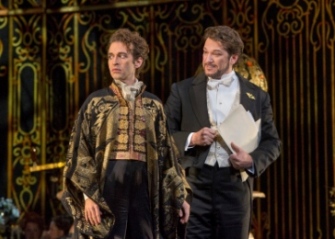Review: Die Fledermaus

Anthony Roth Costanzo and Paulo Szot in Die Fledermaus
(©Ken Howard/Metropolitan Opera)
The Metropolitan Opera appropriately ushered in the New Year with Die Fledermaus, Johann Stauss Jr.’s classic comedic operetta set on New Year’s Eve. Revised with new English language lyrics and dialogue by theatrical veterans Jeremy Sams and Douglas Carter Beane (Sister Act, Cinderella) respectively, the glittering production manages to entertain despite some glaring missteps that rob the effervescent work of much of its fizz.
Updated to turn-of-the-century Vienna, the new version directed by Sams retains the familiar story of duplicitous Gabriel von Eisenstein (Christopher Maltman) and his long-suffering wife Rosalinde (Susanna Phillips) attending a glittery New Year’s Eve ball at the palatial home of Prince Orlofsky (Anthony Roth Costanzo) at their behest of their friend Dr. Falke (Paulo Szot). Falke is intent on getting revenge on Eisenstein, who is supposed to report to jail for having assaulted a policeman, over a slight years earlier, while Rosalinde is determined to catch her cheating spouse in the act. To that end, she poses as a Hungarian countess who her oblivious husband is promptly intent on seducing. Also present at the ball is the couple’s maid Adele (Jane Archibald), who has pretended to be visiting her dying aunt, and the jail’s warden Frosch (Danny Burstein), disguised as a Frenchman. Farcical complications ensue.
Unfortunately, the usually lighter-than-air piece has here been burdened with reams of expository dialogue that slows the action down and results in a bloated running time of nearly four hours. Both the book and lyrics feature loads of broadly comic, often contemporary jokes that frequently border on bad taste, including an ill-conceived Holocaust reference. The new English language lyrics, often on the order of “Let’s canoodle, my strudel,” prove frequently awkward for the singers, even if they don’t fully detract from the pleasures of the gorgeously melodic score.
Even such seemingly sure-fire comic interludes as Frosch’s fourth wall-breaking address to the audience fall short, despite the spirited vaudevillian shtick by Broadway veteran Burstein (South Pacific, Follies). The comedy routine stuffed with gags referencing such targets as Andrew Lloyd Webber, The Sound of Music, The Cabinet of Dr. Caligari and child molesting priests produces some genuine laughs but goes on far too long.
Other vulgar touches include the sexily revealing costumes worn by the gorgeously lithe dancers at the party and such bizarre aspects of the lavish set designs as the Christmas tree and menorah decorating the Einsenstein’s home.
To be fair, goofy humor has always proved an integral element to productions of this lighthearted work. But the tone-deaf aspects of most of the comic flourishes prove more wearisome than exhilarating.
Still, under the spirited conducting of Adam Fischer, the orchestra and singers do ample justice to the music. Particular standouts include Michael Fabiano, displaying a gorgeous tenor as Rosalinde’s ardent suitor, Alfred; countertenor Costanzo, unveiling thrilling high notes as the outlandishly costumed Orlofsky; and Szot, whose resonant baritone remains ever thrilling.
Metropolitan Opera, Lincoln Center. 212-362-6000. www.metoperafamily.org. Through Feb. 22.
| Print article | This entry was posted by Frank on 01/16/14 at 02:30:26 am . Follow any responses to this post through RSS 2.0. |